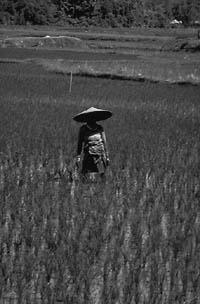Methane and rice

Methane (CH4) is the gas most affected by Earth warming after carbon dioxide (CO2) and freons. It could be responsible for 20% of the temperature increase of the last century. Its infrared absorption capacity gives it a high heating capacity, but also reduces the oxidation capacity of the pollutants of the troposphere.
The origin of atmospheric methane is almost exclusively biological, generated by human activity around 70%. But 20-24% of the total comes from rice paddies, whose conditions are very anomalous. 120 grams of methane per kilo of rice are generated.
They also expect a 60% increase in rice production over the next 30 years. Therefore, we have seen the need to reduce the amount of methane produced in rice paddies and for this reason we are investigating at the Institut International de Recherche sur le Riz (IRRI).
The results obtained so far have shown that the solution can be periodic drainage, since the drainage of wells twice along the rice cycle supposes 80% less methane.





